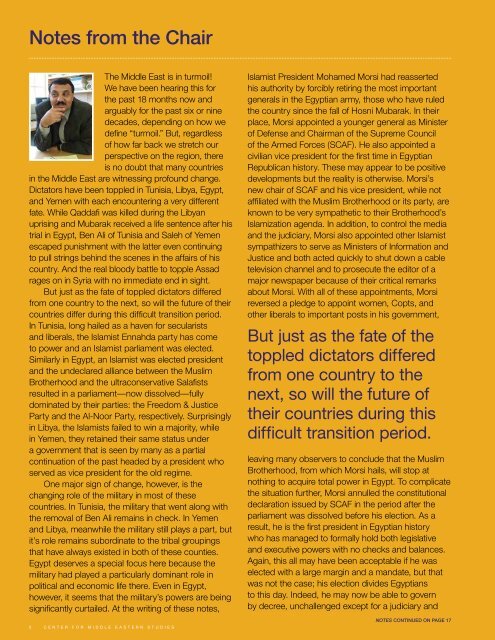CMES newsFall 12_3_web.pdf - Center for Middle Eastern Studies ...
CMES newsFall 12_3_web.pdf - Center for Middle Eastern Studies ...
CMES newsFall 12_3_web.pdf - Center for Middle Eastern Studies ...
Create successful ePaper yourself
Turn your PDF publications into a flip-book with our unique Google optimized e-Paper software.
notes from the chair<br />
The <strong>Middle</strong> East is in turmoil!<br />
We have been hearing this <strong>for</strong><br />
the past 18 months now and<br />
arguably <strong>for</strong> the past six or nine<br />
decades, depending on how we<br />
define “turmoil .” But, regardless<br />
of how far back we stretch our<br />
perspective on the region, there<br />
is no doubt that many countries<br />
in the <strong>Middle</strong> East are witnessing profound change .<br />
Dictators have been toppled in Tunisia, libya, Egypt,<br />
and Yemen with each encountering a very different<br />
fate . While Qaddafi was killed during the libyan<br />
uprising and Mubarak received a life sentence after his<br />
trial in Egypt, Ben Ali of Tunisia and Saleh of Yemen<br />
escaped punishment with the latter even continuing<br />
to pull strings behind the scenes in the affairs of his<br />
country . And the real bloody battle to topple Assad<br />
rages on in Syria with no immediate end in sight .<br />
But just as the fate of toppled dictators differed<br />
from one country to the next, so will the future of their<br />
countries differ during this difficult transition period .<br />
In Tunisia, long hailed as a haven <strong>for</strong> secularists<br />
and liberals, the Islamist Ennahda party has come<br />
to power and an Islamist parliament was elected .<br />
Similarly in Egypt, an Islamist was elected president<br />
and the undeclared alliance between the Muslim<br />
Brotherhood and the ultraconservative Salafists<br />
resulted in a parliament—now dissolved—fully<br />
dominated by their parties: the Freedom & Justice<br />
Party and the Al-Noor Party, respectively . Surprisingly<br />
in libya, the Islamists failed to win a majority, while<br />
in Yemen, they retained their same status under<br />
a government that is seen by many as a partial<br />
continuation of the past headed by a president who<br />
served as vice president <strong>for</strong> the old regime .<br />
One major sign of change, however, is the<br />
changing role of the military in most of these<br />
countries . In Tunisia, the military that went along with<br />
the removal of Ben Ali remains in check . In Yemen<br />
and libya, meanwhile the military still plays a part, but<br />
it’s role remains subordinate to the tribal groupings<br />
that have always existed in both of these counties .<br />
Egypt deserves a special focus here because the<br />
military had played a particularly dominant role in<br />
political and economic life there . Even in Egypt,<br />
however, it seems that the military’s powers are being<br />
significantly curtailed . At the writing of these notes,<br />
2 center <strong>for</strong> middle eastern studies<br />
Islamist President Mohamed Morsi had reasserted<br />
his authority by <strong>for</strong>cibly retiring the most important<br />
generals in the Egyptian army, those who have ruled<br />
the country since the fall of Hosni Mubarak . In their<br />
place, Morsi appointed a younger general as Minister<br />
of Defense and Chairman of the Supreme Council<br />
of the Armed Forces (SCAF) . He also appointed a<br />
civilian vice president <strong>for</strong> the first time in Egyptian<br />
republican history . These may appear to be positive<br />
developments but the reality is otherwise . Morsi’s<br />
new chair of SCAF and his vice president, while not<br />
affiliated with the Muslim Brotherhood or its party, are<br />
known to be very sympathetic to their Brotherhood’s<br />
Islamization agenda . In addition, to control the media<br />
and the judiciary, Morsi also appointed other Islamist<br />
sympathizers to serve as Ministers of In<strong>for</strong>mation and<br />
Justice and both acted quickly to shut down a cable<br />
television channel and to prosecute the editor of a<br />
major newspaper because of their critical remarks<br />
about Morsi . With all of these appointments, Morsi<br />
reversed a pledge to appoint women, Copts, and<br />
other liberals to important posts in his government,<br />
But just as the fate of the<br />
toppled dictators differed<br />
from one country to the<br />
next, so will the future of<br />
their countries during this<br />
difficult transition period.<br />
leaving many observers to conclude that the Muslim<br />
Brotherhood, from which Morsi hails, will stop at<br />
nothing to acquire total power in Egypt . To complicate<br />
the situation further, Morsi annulled the constitutional<br />
declaration issued by SCAF in the period after the<br />
parliament was dissolved be<strong>for</strong>e his election . As a<br />
result, he is the first president in Egyptian history<br />
who has managed to <strong>for</strong>mally hold both legislative<br />
and executive powers with no checks and balances .<br />
Again, this all may have been acceptable if he was<br />
elected with a large margin and a mandate, but that<br />
was not the case; his election divides Egyptians<br />
to this day . Indeed, he may now be able to govern<br />
by decree, unchallenged except <strong>for</strong> a judiciary and<br />
notes contInued on pAge 17


